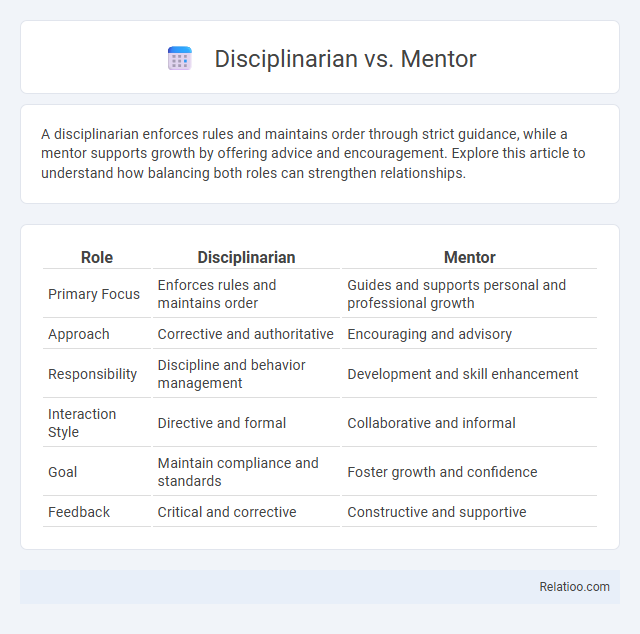A disciplinarian enforces rules and maintains order through strict guidance, while a mentor supports growth by offering advice and encouragement. Explore this article to understand how balancing both roles can strengthen relationships.
Table of Comparison
| Role | Disciplinarian | Mentor |
|---|---|---|
| Primary Focus | Enforces rules and maintains order | Guides and supports personal and professional growth |
| Approach | Corrective and authoritative | Encouraging and advisory |
| Responsibility | Discipline and behavior management | Development and skill enhancement |
| Interaction Style | Directive and formal | Collaborative and informal |
| Goal | Maintain compliance and standards | Foster growth and confidence |
| Feedback | Critical and corrective | Constructive and supportive |
Understanding the Role of a Disciplinarian
A disciplinarian enforces rules and maintains order by applying consistent consequences to guide behavior, contrasting with a mentor who offers guidance and support to foster personal growth. Understanding the role of a disciplinarian helps you recognize their importance in establishing structure and accountability in educational or professional settings. Their focus on discipline ensures that standards are upheld, creating an environment conducive to learning and development.
Defining the Mentor Approach
The mentor approach centers on guidance, support, and personal growth rather than strict control or punishment, emphasizing open communication and trust-building. Unlike disciplinarians who enforce rules rigidly, mentors foster empowerment and skill development tailored to individual needs. Your relationship with a mentor encourages collaborative problem-solving and long-term development, creating a positive environment for learning and self-improvement.
Key Differences Between Disciplinarian and Mentor
The key differences between a disciplinarian and a mentor lie in their approach and objectives: a disciplinarian enforces rules and maintains order through authority and consequences, while a mentor provides guidance, support, and encouragement for personal and professional growth. Your experience with a disciplinarian may involve structured correction, whereas a mentor fosters development through advice and positive reinforcement. Understanding these distinctions helps you choose the right support system for achieving discipline or growth goals.
Core Principles of Discipline in Leadership
Core principles of discipline in leadership emphasize consistent enforcement of rules, clear expectations, and accountability to foster respect and productivity within teams. Disciplinarians prioritize structure and order, focusing on correcting behavior through consequences, while mentors guide through support, encouragement, and development of intrinsic motivation. Balancing firm discipline with empathetic mentorship creates a leadership style that cultivates growth, trust, and sustainable performance.
The Value of Mentorship in Personal Growth
Mentorship plays a crucial role in personal growth by offering guidance, support, and constructive feedback tailored to individual needs, unlike disciplinarians who primarily focus on enforcing rules and correcting behavior. Mentors foster development through empathy and shared experiences, empowering mentees to build self-confidence and resilience. This relational approach enhances long-term success by nurturing intrinsic motivation and critical thinking skills.
Impact on Team Culture: Discipline vs Mentorship
A disciplinarian enforces strict rules and consequences, which can create a culture of order but may also lead to fear or resentment within the team. A mentor fosters growth through guidance, support, and knowledge sharing, cultivating a positive and collaborative team environment. Balancing discipline with mentorship enhances team culture by maintaining accountability while encouraging professional development and trust.
Pros and Cons of the Disciplinarian Style
The disciplinarian style enforces strict rules and expects obedience, promoting order and clear boundaries while often fostering respect through authority. Pros include consistent structure and immediate behavioral correction, which can be effective in managing challenging behaviors. Cons involve potential suppression of creativity, emotional distance, and resistance or fear from those subjected to harsh discipline, limiting open communication and personal growth.
Mentorship: Benefits and Potential Drawbacks
Mentorship fosters professional growth by providing personalized guidance, skill development, and emotional support, enhancing career trajectories and job satisfaction. Benefits include increased confidence, expanded networks, and improved problem-solving abilities, which contribute to long-term success. Potential drawbacks involve dependency risks, mismatched expectations, or limited perspectives if the mentor's approach lacks adaptability or openness to diverse viewpoints.
When to Be a Disciplinarian, When to Be a Mentor
You should be a disciplinarian when enforcing rules and maintaining order is crucial to ensure safety and accountability. Being a mentor is essential when guiding growth, providing support, and fostering long-term development based on trust and experience. Balancing these roles depends on situational needs, emphasizing firm boundaries during conflicts and empathetic guidance during learning opportunities.
Finding the Right Balance: Blending Discipline and Mentorship
Finding the right balance between disciplinarian and mentor roles involves blending firm guidance with supportive coaching to foster growth while maintaining clear boundaries. You benefit most when discipline is applied consistently to establish structure, and mentorship offers personalized encouragement that nurtures development and confidence. Cultivating this synergy enhances learning outcomes and builds trust, ultimately empowering individuals to reach their full potential.

Infographic: Disciplinarian vs Mentor
 relatioo.com
relatioo.com